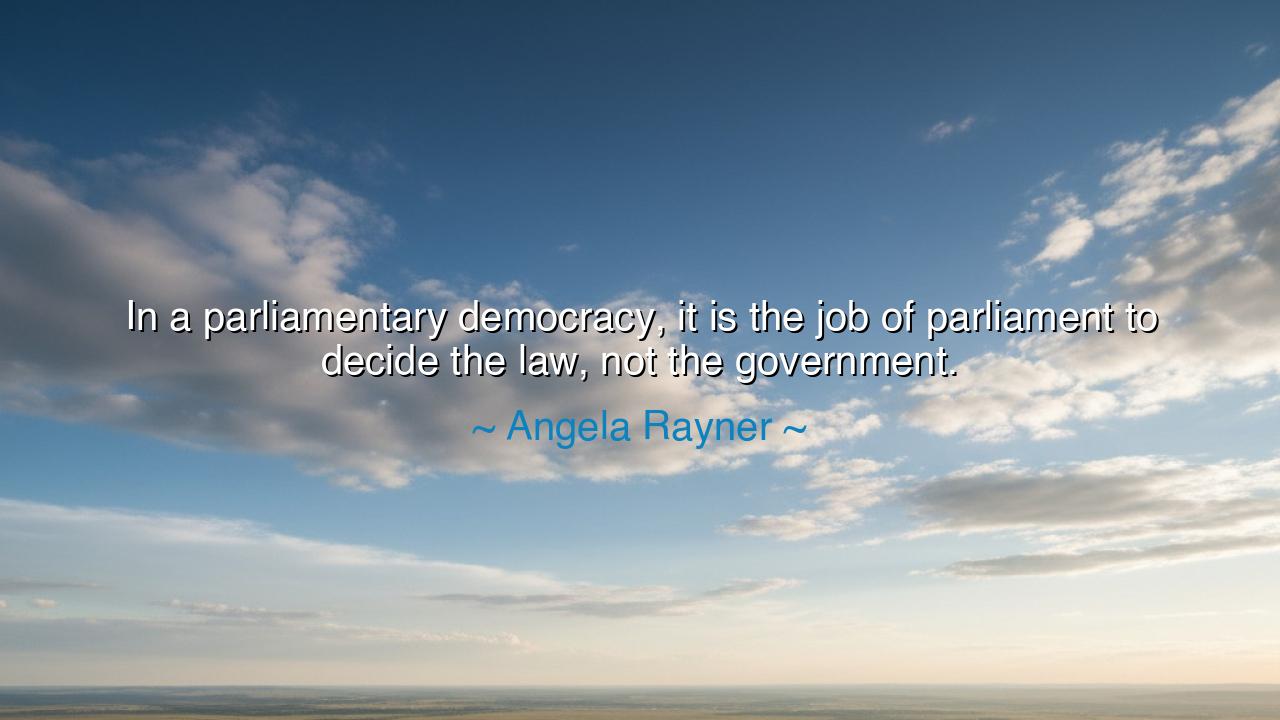
In a parliamentary democracy, it is the job of parliament to
In a parliamentary democracy, it is the job of parliament to decide the law, not the government.






When Angela Rayner declared, “In a parliamentary democracy, it is the job of parliament to decide the law, not the government,” she was speaking to the very essence of democratic order — that the power to make laws must rest not in the hands of rulers, but in the collective voice of the people’s representatives. Her words shine with the fire of constitutional truth: that governments are servants of the law, not its masters, and that when this sacred balance is forgotten, liberty itself trembles. In a world where authority so often seeks to stretch beyond its bounds, Rayner’s reminder is both timeless and necessary — a call to guard the foundations of freedom from the creeping vines of centralized power.
The origin of this quote lies in the traditions of British parliamentary democracy, a system built upon centuries of struggle between monarch and parliament, power and accountability. Angela Rayner, Deputy Leader of the UK’s Labour Party, spoke these words to reaffirm a principle that lies at the heart of the Westminster model: that sovereignty belongs not to the government of the day, but to Parliament — the assembly of the people’s will. Her warning was a response to a modern danger: when executive power begins to govern by decree, sidestepping legislative debate, democracy becomes a stage play — the actors still move, but the script no longer belongs to the people. Her words summon the wisdom of history, reminding us that when the government begins to write its own laws, it ceases to be a servant and becomes a ruler.
In the style of the ancients, one might say that Rayner spoke in the spirit of Solon of Athens, who crafted laws not to please the powerful, but to protect the common good. Solon understood that the strength of a free state lies in balance — that law must rise above the ambitions of those who govern. The same truth echoed through the Magna Carta, when barons and commoners together forced the English king to kneel before the rule of law. It was written then, as it must be remembered now: “No one is above the law.” Rayner’s words are the modern echo of that ancient promise — a warning that democracy dies not in a single stroke, but in the slow erosion of accountability, when governments begin to confuse authority with ownership.
History bears witness to what happens when the balance of power is forgotten. In the 17th century, King Charles I of England dissolved Parliament and ruled by his own hand, claiming divine right as his shield. His tyranny led to civil war, and his defiance ended on the scaffold. The lesson carved into history’s stone is this: when rulers claim the power to make law without consent, they claim the right to rule without limit. Parliament was restored so that never again would one man or one government command the law — for law belongs to the people, and those who serve it must do so in humility. Rayner’s statement is, in this sense, a continuation of that long tradition of defiance against unchecked power.
Yet, her words also speak not only to politicians, but to citizens. For in a parliamentary democracy, the law reflects the conscience of the nation — and when the people grow indifferent, their silence becomes permission. It is not enough for parliament to exist; it must be watched, questioned, and engaged. Democracy is not a gift that sustains itself; it is a flame that must be tended. When citizens stop caring who writes their laws, or how, the government begins to write them alone. Thus, Rayner’s words are also a plea to the people: guard your parliament, for it is the fortress of your freedom.
Her insight carries a moral truth that transcends politics: power must always answer to principle. Governments are transient — they rise and fall with elections, but law is enduring. It is the covenant that binds the living and the unborn, the strong and the weak, the ruler and the ruled. To preserve that covenant, every generation must remember the hierarchy of justice: the law above government, and conscience above law. When governments forget this order, they cease to govern democratically and begin to reign imperially.
The lesson of Angela Rayner’s words is clear: defend the separation between lawmaking and governing, or risk losing both freedom and fairness. Every citizen must understand that democracy is not defined by the presence of elections alone, but by the preservation of institutions that ensure no power stands above the law. The people must never surrender their right to question, nor allow the government to silence the voice of Parliament.
So let her teaching be remembered, as if spoken in marble halls to future generations: the government may lead, but Parliament must decide. For when rulers obey the law they serve, justice endures; but when they bend it to their will, tyranny begins anew. Let us therefore cherish the rule of law as the highest guardian of liberty, and stand watchful over it — as citizens, as heirs, and as keepers of the flame of democracy.






AAdministratorAdministrator
Welcome, honored guests. Please leave a comment, we will respond soon